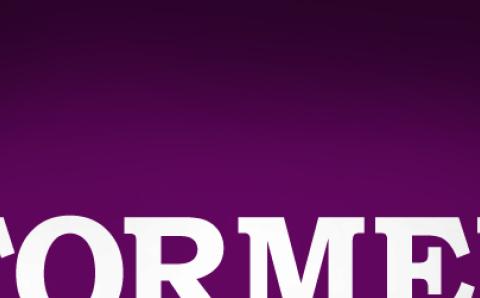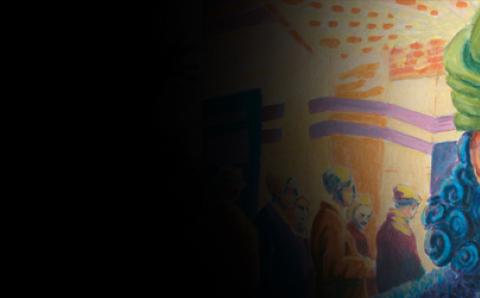Keith Getty is a Northern Ireland composer best known for pioneering modern hymns. Many of his songs are co-written with his wife, Kristyn Getty, as well as with British songwriter and worship leader Stuart Townend. The most widely used of the Getty-Townend hymns are “In Christ Alone,” “The Power of the Cross,” and “Speak, O Lord.” The Gettys currently live in Nashville, Tenn., with their daughter, Eliza Joy. They made their first stop at a Christian Reformed church (Faith CRC in Elmhurst, Ill.) in October, just two days after the release of their latest album, Joy: An Irish Christmas.
Q. Your Christmas tour begins in December, but you are beginning to weave the songs into your concerts now that the album has been released. Tell me about Joy: An Irish Christmas.
A. The Christmas project is the greatest artistic project I have been involved with in my whole life of 36 years. In many ways this project has been forming in my head for 20 years—so to actually get it done, I am just bursting.
The goal over the next five years is to grow the Christmas tour. Everything springs from our idea of writing modern hymns, or in this case, modern carols. The whole structure of the hymn tour is to try and reach as many groups as possible with the hymns, so we combine the church tour with events like a chapel or a seminar.
The Christmas tour is a different concept—it’s really about creating a show. Christmas is a unique time. It’s a wonderful opportunity as a Christian and a wonderful opportunity for music directors and pastors to open a window in Christianity and let a fresh breeze come out.
Q. Given the shortness of the season, do you think churches are open to new Christmas songs, or do pastors and worship leaders feel compelled to stick with the beloved Christmas carols?
A. I think that’s true, but I think there’s good reason for that. I think people want to sing the Christmas songs, and the Christmas songs are good songs. To be honest, I would rather see people adopt the same principles with hymns all year around as they do with carols—more so than seeing them do more new songs at Christmas. It seems to be the one time of year, for whatever reason, that our heritage as believers is honored in the context of church music. Our album is half of each, so we’re hoping that a few of the churches will try one or two of the songs.
Q. Your Christmas album has an obvious Irish flare to it. How did it feel to inject so much of that feel into the album?
A. It’s brilliant. The thing about Irish music is it pushes us a little bit further toward the sense of excitement and celebration. It also pushes us further the other way, toward reflection and pathos. There is a wonderful element of both of those in the project.
Q. Several of your songs are slated for inclusion in the new hymnal being published by Faith Alive (Lift Up Your Hearts), to be used by the Christian Reformed Church and Reformed Church in America denominations. How do you feel about the use of hymnals today?
A. There are benefits to every medium. When using an overhead projector or a computer, you can get a song ready in five minutes. It means people’s hands and bodies are free for creative expression, and you can add a visual dimension if you find that useful. All of those things are good.
The hymnbook puts an emphasis on quality. In other words, you have to pick a song that’s going to last for a number of years. Similarly, people then get to know those hymns over a period of time and make them a part of their lives. A hymnbook has multiple uses. I personally am a big believer in them and think they have been on the rise again the past few years.
Q. Some churches remain committed to hymns while some people now growing up in the church are not at all familiar with them. Why is the hymn so important?
A. I think what’s important is that we let the Word of Christ dwell in us richly when we sing. What I think is important is that we let our congregations, no matter who they are, their age, whatever body they’re from, be unified, singing to God passionately.
At the same time, I would say that there is an artistry to and familiarity with the best of hymns that is rarely replicated in modern songs. When my grandfather was dying, he was able to quote old hymns and passages of Scripture; I’m sure that was a great solace to him. What is our generation going to do when they get older? Ninety percent of their songs have a nine-month shelf life.
Q. If people were to walk away from listening to your music and share a description of it with their friends, what do you hope they would say?
A. I’d love them to be uplifted. I’d love for them to be inspired. My wife has just written a song, “How Suddenly a Baby Cries,” and one of the underpinnings of the song is the fact—and Billy Graham says this well—that Christ doesn’t leave you neutral. Herod didn’t become moderately nicer and more tolerant. Herod became infinitely more evil. Mary became more holy. Joseph, Simeon, Anna—they all became more holy. There are only two ways you can go. I would hope that by presenting Christ to people that everybody, wherever they’re at—whether they are people who have yet to believe or [who] have believed for 70 years, someone whose life is beginning or [someone whose life is] drawing to a close—that something in the connection of the music will draw them closer to Christ.
About the Author
Melissa Holtrop









